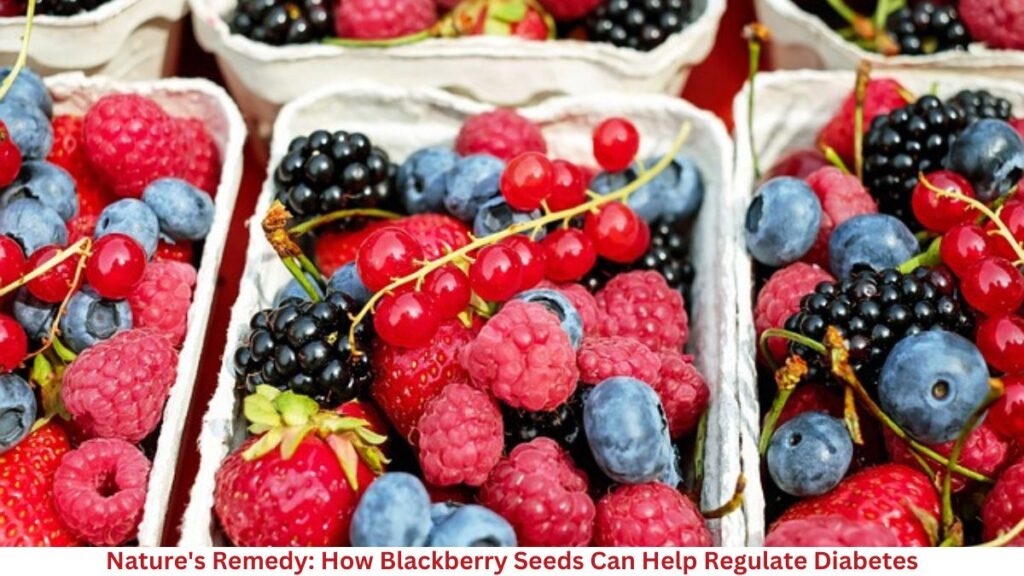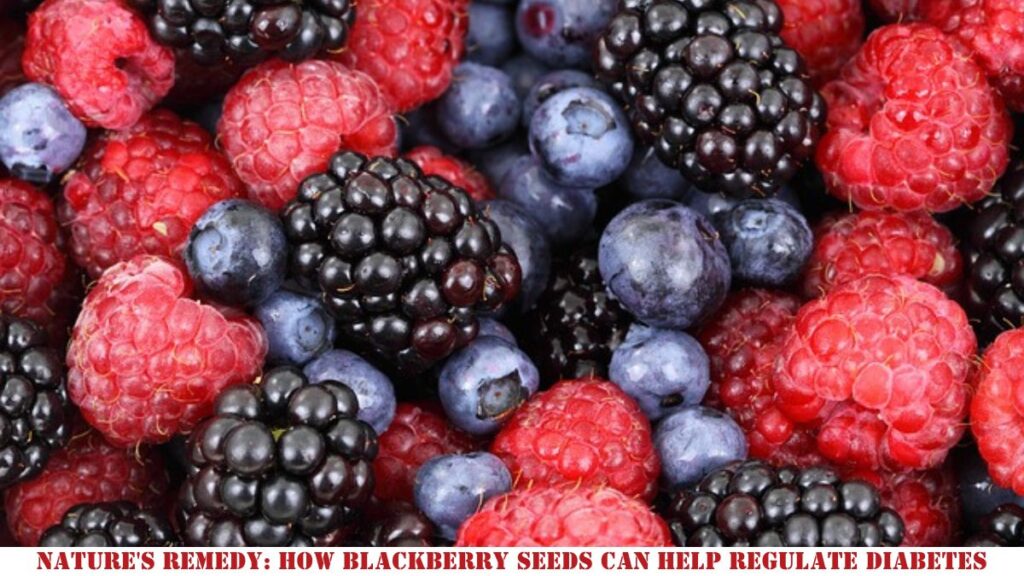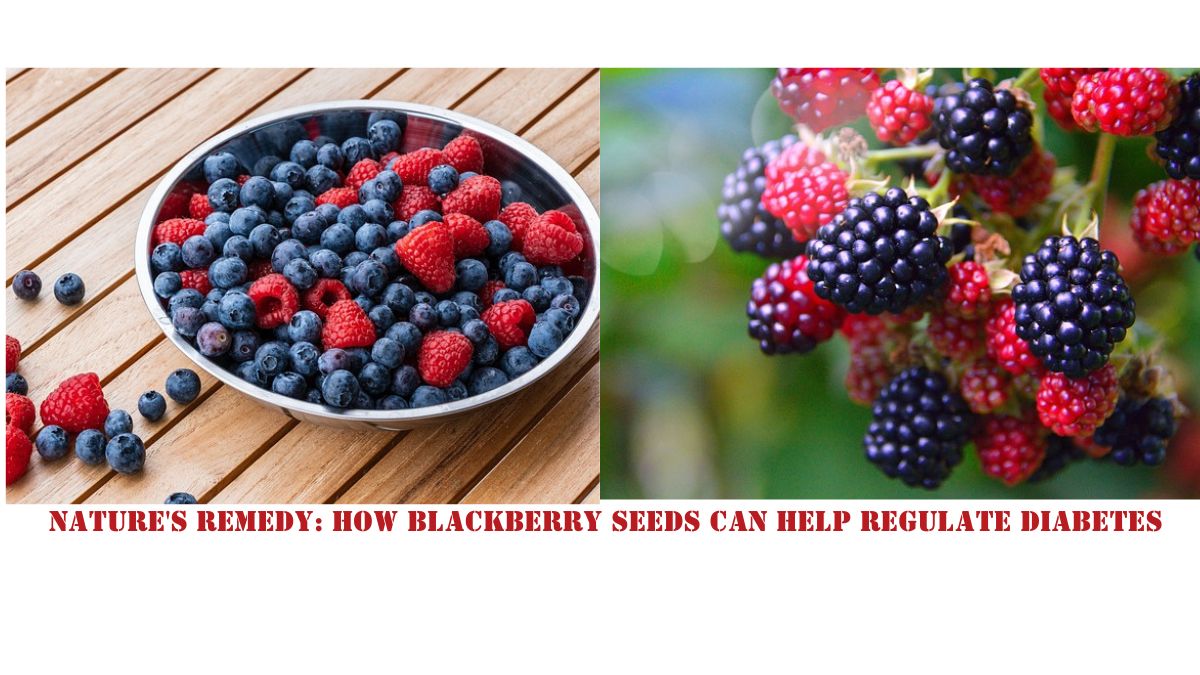Introduction:-
Nature’s Remedy: How Blackberry Seeds Can Help Regulate Diabetes

In the realm of natural remedies, blackberry seeds stand out as a potent ally in the battle against diabetes. Packed with essential nutrients and powerful compounds, these tiny seeds offer a holistic approach to managing blood sugar levels and promoting overall well-being.
How do blackberry seeds contribute to regulating blood sugar levels in individuals with diabetes?
Blackberry seeds contribute to regulating blood sugar levels in individuals with diabetes through several mechanisms:
- High Fiber Content: Blackberry seeds are rich in dietary fiber, particularly soluble fiber. Soluble fiber slows down the digestion and absorption of carbohydrates, preventing rapid spikes in blood sugar levels after meals. By promoting slower and more stable glucose release into the bloodstream, fiber helps regulate blood sugar levels over time.
- Improved Insulin Sensitivity: Some research suggests that certain compounds present in blackberry seeds may enhance insulin sensitivity. Insulin is a hormone that regulates blood sugar levels by facilitating the uptake of glucose from the bloodstream into cells for energy. By improving insulin sensitivity, blackberry seeds may help cells respond more effectively to insulin, thereby aiding in blood sugar regulation.
- Antioxidant Activity: Blackberry seeds contain potent antioxidants, such as vitamin C and polyphenols, which help combat oxidative stress and inflammation. Oxidative stress and inflammation are closely associated with insulin resistance and impaired glucose metabolism, both of which are hallmark features of diabetes. By neutralizing free radicals and reducing inflammation, antioxidants in blackberry seeds may help improve overall metabolic function and support better blood sugar control.
- Nutrient Profile: Blackberry seeds are also rich in essential vitamins and minerals, including manganese, magnesium, and vitamin K. These nutrients play various roles in metabolic processes and may indirectly contribute to better blood sugar regulation. For example, magnesium is involved in glucose metabolism and insulin action, while vitamin K has been linked to improved insulin sensitivity.
In summary, blackberry seeds offer a combination of dietary fiber, antioxidants, and essential nutrients that work synergistically to help regulate blood sugar levels in individuals with diabetes. By incorporating blackberry seeds into their diet, individuals may experience improved glycemic control and reduced risk of complications associated with diabetes. However, it’s essential to consult with a healthcare professional before making any significant changes to your diet or treatment plan.
Are there any studies or research findings that support the claims about the miraculous properties of blackberry seeds for diabetes control?

While blackberry seeds have shown promising potential in contributing to diabetes control, research specifically focused on their effects is somewhat limited. However, several studies have investigated the health benefits of blackberries and their components, which can provide insights into the potential effects of blackberry seeds on diabetes management. Here are some relevant findings:
- Antioxidant and Anti-inflammatory Effects: Numerous studies have highlighted the antioxidant and anti-inflammatory properties of blackberries. These properties are beneficial for overall health and may indirectly support diabetes management by reducing oxidative stress and inflammation, which are implicated in the development and progression of diabetes and its complications.
- Impact on Blood Sugar Levels: While there’s a lack of direct research on blackberry seeds and blood sugar control, studies on blackberries themselves suggest potential benefits for glycemic control. For example, some studies have demonstrated that consuming blackberries or blackberry extracts can lead to improvements in insulin sensitivity and reductions in blood sugar levels in individuals with diabetes or insulin resistance.
- Fiber Content: Blackberries, including their seeds, are rich in dietary fiber. Research has consistently shown that dietary fiber intake is associated with better glycemic control and reduced risk of type 2 diabetes. The high fiber content of blackberry seeds may contribute to these beneficial effects.
- Animal Studies: Some animal studies have investigated the effects of blackberry extracts or components on diabetes-related outcomes. While findings from animal studies may not directly translate to humans, they provide valuable preliminary evidence supporting further research in human populations.
Overall, while there’s a paucity of research specifically focused on blackberry seeds and their effects on diabetes control, existing studies on blackberries and related components offer promising insights. Further research, including well-designed clinical trials, is needed to elucidate the specific mechanisms and potential benefits of blackberry seeds for individuals with diabetes.
Are there any potential side effects or precautions to consider when consuming blackberry seeds for diabetes control?
While blackberry seeds are generally considered safe for consumption and may offer various health benefits, including potential support for diabetes control, there are some precautions to consider:

- Allergic Reactions: Individuals with known allergies to berries or other related fruits may experience allergic reactions to blackberries and their seeds. Symptoms of berry allergies can include itching, swelling, hives, difficulty breathing, or even anaphylaxis. If you have a known allergy, it’s essential to avoid blackberry seeds and products containing them.
- Digestive Issues: Blackberry seeds are rich in dietary fiber, which can have a laxative effect and may cause digestive discomfort or gastrointestinal upset in some individuals, especially if consumed in large amounts. It’s essential to introduce blackberry seeds into your diet gradually and drink plenty of water to help prevent constipation or other digestive issues.
- Seed Size: Blackberry seeds are small and hard, which may pose a choking hazard, particularly for young children or individuals with swallowing difficulties. Care should be taken when consuming blackberries or products containing whole seeds to avoid choking incidents.
- Interactions with Medications: While there are no known interactions between blackberry seeds and common diabetes medications, it’s always advisable to consult with a healthcare professional before adding significant dietary changes, including blackberry seeds, especially if you are taking medications for diabetes or other health conditions. Certain medications may interact with dietary components, potentially affecting their effectiveness or causing adverse effects.
- Pesticide Residues: Like other fruits and vegetables, blackberries may contain pesticide residues if conventionally grown. To minimize exposure to pesticides, consider choosing organic blackberries whenever possible, or thoroughly wash conventionally grown blackberries before consumption.
- Blood Sugar Monitoring: If you’re incorporating blackberry seeds into your diet as part of your diabetes management plan, it’s essential to monitor your blood sugar levels regularly. While blackberry seeds may offer potential benefits for glycemic control, individual responses can vary, and it’s crucial to ensure that they fit well within your overall dietary and diabetes management strategy.
Overall, while blackberry seeds can be a nutritious addition to a balanced diet and may offer potential benefits for diabetes control, it’s essential to consume them in moderation and be mindful of any potential allergies, digestive issues, or interactions with medications. If you have any concerns or experience adverse effects, consult with a healthcare professional for personalized guidance.
Conclusion:
Nature has bestowed upon us a remarkable remedy in the form of blackberry seeds, offering a natural and holistic approach to regulating diabetes. With their rich nutritional profile and potent health-promoting properties, blackberry seeds have the potential to play a valuable role in diabetes management. By incorporating these tiny yet mighty seeds into your diet, you can take proactive steps towards achieving better blood sugar control and improving overall health and well-being…. see more






